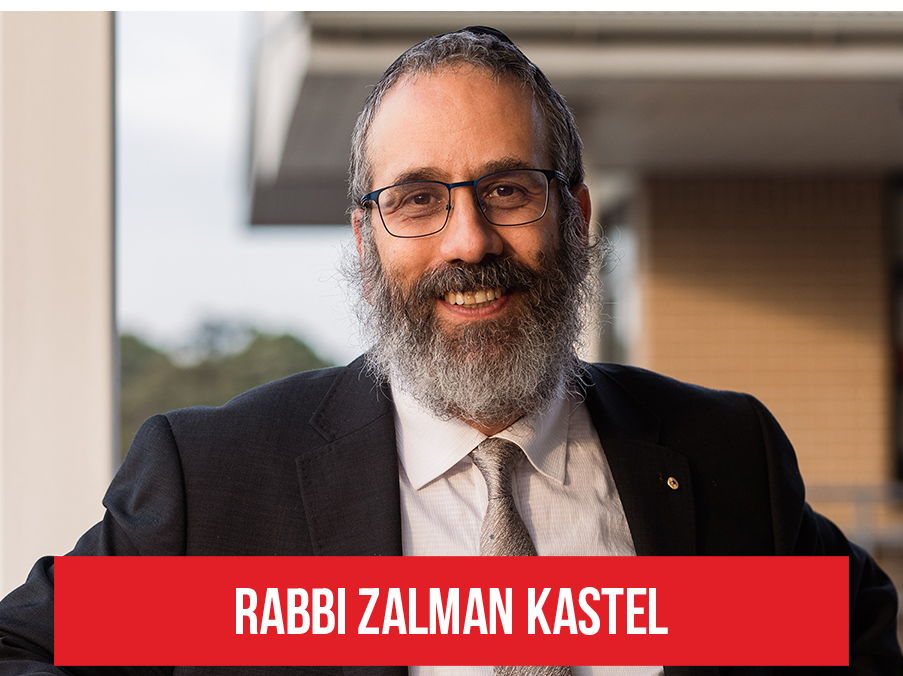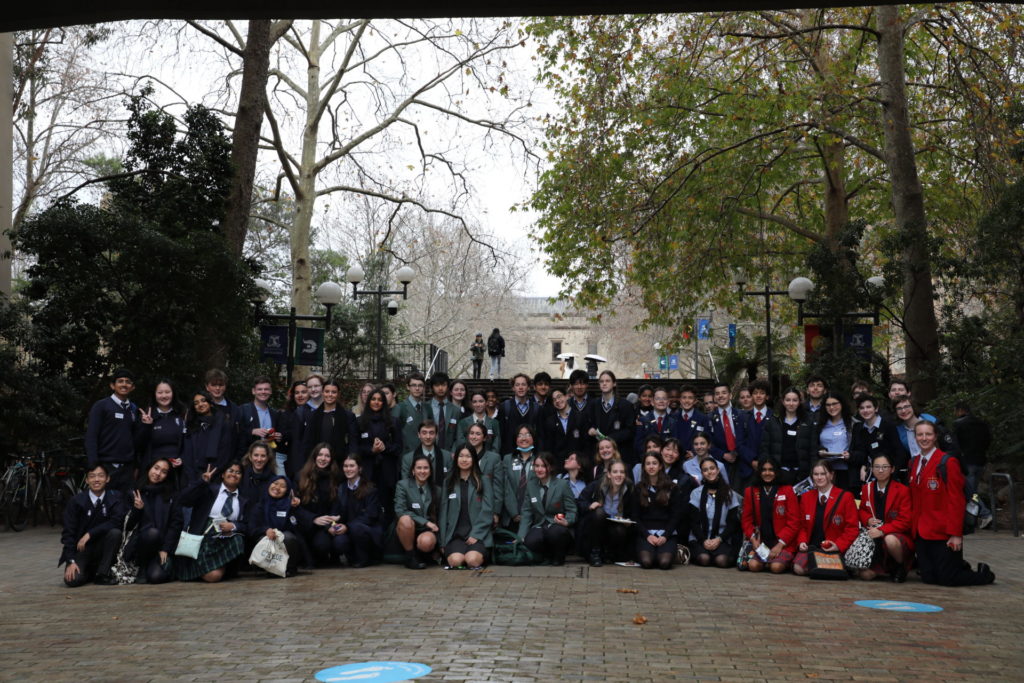Educational organisation Together For Humanity (TFH) recently held its inaugural Victorian Youth Summit at the University of Melbourne, with students from 15 schools from across Victoria’s Government, Catholic and Independent sectors attending.
With the theme ‘Diversity and Connection’, the Victorian Youth Summit united students from across Victoria’s education spectrum and asked them to use their voices to advocate for diversity and inclusion directly to the political, religious and community leaders in attendance.
Supporting a new generation of positive change-makers
Prejudice continues to be a problem in Australia. According to a recent study, one in three Australian teens report experiencing discrimination [1]. Inspiring and equipping future leaders to be positive change-makers in their communities is central to TFH’s mission to combat prejudice and foster inclusivity.
Rabbi Zalman Kastel AM, Dean and founder of Together For Humanity, said that the Youth Summits allow students to hear first-hand about instances of prejudice and discrimination while developing a deeper understanding of diversity in Australia, and empower them to make changes in their schools and communities.
“The path to creating a more inclusive, united Australia starts with promoting belonging and inspiring empathy in the young people who will one day be making decisions that impact all Australians,” he said. “As the teachers, community leaders and policy makers of today, it is up to us to educate future generations about diversity, prejudice and discrimination, and allow them the opportunity to address these issues.”

Nurturing a strong student voice for inclusion and diversity
A key focus of the Victorian Youth Summit was around giving a platform to the ‘student voice’. Students presented on issues within their schools and communities and worked together to develop proposals to address them. By the end of the event, light was shone on some key areas that young people believe are of vital importance to inclusion in Australia:
-
Addressing racism and discrimination in society
-
Inclusion and recognition of diversity within schools and communities
-
Equal access to education and resources, especially for migrants and refugees
-
Mental health and social connection within and across generations
While the summit was a fresh initiative in the Victorian market, TFH has been running diversity education programs in schools for over two decades. The not-for-profit works directly with schools to facilitate programs that challenge stereotypes, promote social belonging and strengthen emotional learning. The programs enable students to work cohesively and embrace differences, while equipping teachers and administrators with the knowledge and skills to make classrooms more inclusive.

When EducationDaily asked Rabbi Kastel why inclusivity was so important in school communities today, his answer was clear:
“Belonging!”
This is, says Rabbi Kastel, “the one word we hear from leaders of groups subjected to prejudice – from an Aboriginal elder in Alice Springs to a Liberian Muslim community leader in Western Sydney”.
“Prejudice erodes students’ feelings of belonging. As a group of Indigenous high school students stated at a Together For Humanity session: ‘All of Australia is a colourful happy mix of cultures, but at the heart of it is us Aboriginal people, isolated from everyone.’ Schools are a reflection of the wider society; education doesn’t exist in a vacuum,” Rabbi Kastel told EducationDaily. “There are students experiencing prejudice and exclusion in our communities where they are made to feel like they don’t belong. For others, it may not impact them directly but it does impact their peers and loved ones – it’s an inescapable reality.
Inclusivity is also vital in terms of equal access to education and equal representation in the school setting. This isn’t just about the future, but the reality that our children face today.”
Making classrooms more inclusive of learners from different cultural, linguistic and religious backgrounds can sometimes be tricky, Rabbi Kastel admits.
Teachers need to know about existing resources for students, such as videos of people from diverse backgrounds sharing their experiences with racism, prejudice or family migration.
“These evoke empathy from students, which is one of the most important ways of countering racism and prejudice and creating inclusive classrooms,” he says. “For administrators, support is obtained through accessing evidence-based resources and ensuring that the school connects and engages with students’ families and the broader ecosystem.”
Read more: Antisemitic bullying is on the rise in schools
Programs include wellbeing programs for years six-12, interschools programs (such as the Youth Summit), free online learning courses, teacher professional development, and interactive curriculum-linked presentations and workshops that help deepen understanding of diverse cultures, faiths and experiences.
“The Victorian Youth Summit was the latest step in Together For Humanity’s plans to expand our programs and events in Victoria, NSW and nationally,” said Rabbi Kastel. “We encourage schools to get in contact with our diverse team of educators to schedule our school-based wellbeing and anti-prejudice programs in their classrooms and to discuss involvement in the future summits.”
Each year, TFH also facilitates the national Intercultural Understanding Partnership (ICUP) Grants, which present successful schools with consultations and financial support (up to $10,000) to address intercultural and/or interfaith challenges in their school communities. The initiative is supported by the Australian Government Department of Education.
Together For Humanity partnered with the Asia Education Foundation (AEF) to present the Victorian Youth Summit on 18 July. Participating schools were Overnewton Anglican Community College, Sacré Coeur, Templestowe College, Mentone Girls Grammar School, Leibler Yavneh College, Eltham College, Korumburra Secondary College, McKinnon Secondary College, Kolbe Catholic College, Melton Secondary College, John Paul College, Caulfield Grammar School, Peninsula Grammar, Mount Waverley Secondary College and Star of the Sea College Brighton.

“A recent study by Western Sydney University has shown that our programs are assisting students to challenge stereotypes, reduce fears of cultural difference, deal with prejudice and discrimination, and develop empathy, mutual awareness and belonging,’ Rabbi Kastel told EducationDaily. “We are seeking to work with more rural and regional schools that already face limited resources and support.”
Although the summit was the first to be held in Victoria, five summits have taken place in New South Wales (NSW) since 2016 and another NSW-based summit is scheduled for Thursday 19 October 2023 at Parliament of NSW and St Stephen’s Uniting Church, Sydney. Applications for the NSW Youth Summit are now open and schools are invited to express their interest by 25 August 2023.
Respectful conversations are key to deeper understanding
“Discomfort is inevitable and was initially observed at the Summit as some schools’ values came up against other schools’ values. However, it presented an opportunity to transcend the discomfort, and look at the common values of living in a socially cohesive community,” says Rabbi Kastel. “Having the opportunity to have conversations in a respectful way in a safe space is essential in creating intercultural understanding.”

Although Rabbi Kastel says that adults often offer solutions that have been tried repeatedly, without any substantive change, what the teenagers presented “were well-considered, impactful ideas”.
“If they are just a snapshot of the youth in this country, then I know we are in good hands – we just need to give them the tools and opportunities to show it.’
[1] Teenagers’ Experience of Discrimination: Growing Up In Australia: The Longitudinal Study of Australian Children (LSAC), partnership between the Department of Social Services, Australian Institute of Family Studies, Australian Bureau of Statistics https://








